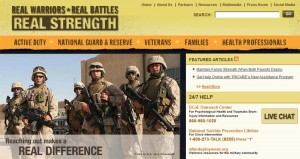As of February 2010, 39% of AW2 Soldiers and Veterans suffer post-traumatic stress disorder (PTSD). Medical professionals are treating PTSD with several different kinds of therapy, counseling, and medications which have proven to be effective. There are alternative therapies and experiences that may also aid in lessoning PTSD symptoms. Please always consult your physician before trying anything new in your treatment. Here are some things that you may want to consider:
Yoga
Several Army posts and military treatment facilities have started teaching yoga classes. It may seem to be a strange idea, but it actually makes a lot of sense. Yoga uses meditation, deep relaxation, stretching, and breathing to reduce physical, emotional, and mental tension. Many people have found it useful in keeping them relaxed, thereby, allowing them to deal with anxiety caused by traumatic events. Some experts believe that therapists treating psychological trauma need to work with the body as well as the mind. Yoga may provide a safe and gentle means of becoming reacquainted with the body and allow people to confront their internal sensations. A study of active-duty Soldiers with PTSD who took yoga found that they were able to sleep better, felt less depressed, felt more comfortable with situations that they couldn’t control, and as a result, felt more control over their lives. If interested, ask your physician about Army or VA locations offering this service.
Service Animals
Service animals are helping people with behavioral health issues live their lives. For example, dogs can wake a person having bad dreams, give a gentle nudge when a person is stressed, and even find misplaced medications. Many people find that service animals allow them to perform daily activities that they couldn’t before, such as running errands. A recent survey showed that 82 percent of PTSD patients with a service dog had a decrease in symptoms, and 40 percent had a decrease in the medication usage. The Department of Defense (DOD) is even starting a 12-month study to find out exactly how the dogs help by comparing Soldiers with PTSD who have dogs with a similar group of Soldiers without a dog. Numerous nonprofit organizations provide service dogs to Soldiers and Veterans at no charge, visit the AW2 Community Support Network Web page for a listing http://www.aw2.army.mil/supporters/index.html.
Theater of War
“Theater of War” is a DOD project designed to remove stigma related to psychological injuries by illustrating how war heroes in history have lived with the psychological effects of battle. The goal of the project is to help military audiences confront and discuss the emotional and psychological effects of combat and war, and the challenges of homecoming. Performances include a dramatic reading of selected scenes from the plays “Ajax” and “Philoctetes” by Sophocles, performed by a rotating cast of film and stage actors. The reading is followed by a town-hall discussion with the audience and a panel of members from the local military community. The Army has sponsored several performances, and 100 performances in 50 military venues are scheduled in the next year. For more information on future performances at Army bases, visit Theater of War at http://www.theater-of-war.com/.
For more information on PTSD and treatment options, visit the Defense Centers of Excellence for Psychological Health and Traumatic Brain Injury at http://www.dcoe.health.mil/ForHealthPros/PTSDTreatmentOptions.aspx.
References:
Yoga
Reeves, Steve. “Yoga Helps Vets Find Balance.” Army News. 7 Jan. 2010. http://www.army.mil/-news/2010/01/07/32565-yoga-helps-vets-find-balance/.
Wills, Denise Kersten. “Healing Life’s Traumas.” Yoga Journal. http://www.yogajournal.com/health/2532.
Service Animals
Suchetka, Diane. “Giving Comfort, Courage to Heal: Psychiatric Service Dogs Offer Patients New Life Outlook.” The Plain Dealer. 26 Jan. 2010. http://www.cleveland.com/healthfit/index.ssf/2010/01/giving_comfort_
courage_to_heal.html.
Gardner, Amanda. “Service Dogs Help Traumatized Veterans Heal.” U.S. News & World Report. 3 Sept. 2009. http://www.usnews.com/health/family-health/brain-and-behavior/articles/2009/09/03/service-dogs-help-traumatized-veterans-heal.html.
Theater of War
Theater of War. Army Stand-To. 26 Jan. 2010. http://www.army.mil/standto/archive/2010/01/26/.
The appearance of external hyperlinks does not constitute endorsement by the United States Department of Defense of the linked web sites, or the information, products or services contained therein. For other than authorized activities such as military exchanges and Morale, Welfare and Recreation (MWR) sites, the United States Department of Defense does not exercise any editorial control over the information you may find at these locations.



